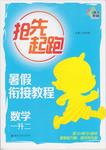
| |||||||||||||||||||||||||||||||||||||||||||||||||||||||||||||||||||||||||
 南大教辅抢先起跑暑假衔接教程南京大学出版社系列答案
南大教辅抢先起跑暑假衔接教程南京大学出版社系列答案科目:初中英语 来源: 题型:050
阅读理解
House prices (价格)in England went up quickly between 1951 and 1972. The following records (记录)show how much a house in London had risen in price since 1955.
Take No. 29 Smith Terrace for example. In 1955, Jane Grey sold it for £(英磅符号)2,000. Mrs Black bought it next to £4,900 and sold it nine years later to Bill and Green White for £22,950. Now four years later, in 1972, the house is at the price of £30,000.
1. The price of the house was as high in 1972 as in the year when Jane Grey sold it.
[ ]
A. about 10 times B. twice
C. 150 percent D. 15 times
2. Mrs Black made a profit of (净赚) .
[
]A
. £2,900 B. £8,050C. £18,050 D. £7,050
3. Of all the people, who got most money?
[
]A
. The Whites B. Jane GreyC. Mrs Black D. No one
4. When did Mrs Black buy the house? In .
[
]A
. 1972 B. 1959C. 1968 D. 1972
5. Jane Grey lived in No. 29 Smith Terrace .
[ ]
A. for four years B. for nine years
C. between 1951 and 1972 D. before 1955
查看答案和解析>>
科目:初中英语 来源: 题型:050
| |||||||||||||||||||||||||||||||||
查看答案和解析>>
科目:初中英语 来源: 题型:050
| |||||||||||||||||||||||||||||||||
查看答案和解析>>
科目:初中英语 来源: 题型:050
| |||||||||||||||||||||||||||||||||
查看答案和解析>>
科目:初中英语 来源: 题型:050
No one knows how man learned to make words. Perhaps he began by making sounds like those made by animals. Perhaps he made sounds like those he heard all round him. As the centuries(世纪) went by, he made more and more new words, This is what we mean by language.
People living in different countries made different kinds of words. Today there are about fifteen hundred different languages in
the world. Each has many thousands of words. A very large English dictionary, for example, has four or five hundred thousand words. But before you leave school you will learn only a few thousands more. Then you should learn more and more words. Read as many books as you can. There are plenty of books written in easy English for you to read. You will enjoy them. When you meet a new word, find it in your dictionary. Your dictionary is your most useful book.
根据短文内容,选择最恰当的答案。
1. The main idea of the first paragraph is ______.
[ ]
A. how animals make sounds
B. how man made words
C. man heard different sounds round him
D. man made more and more words
2. About how many different languages are there in the world?
[ ]
A. 150 B. 1500 C. 5000 D. 500
3. A very large English dictionary might have over ______ words.
[ ]
A. 400,000 B. 50,000 C. 40,000 D. 800,000
4. After you leave school, you should learn ______.
[ ]
A. only a thousand words B. all the words
C. more words D. all kinds of languages
5. If you want to know more new words, you can ______.
[ ]
A. read many difficult books B. read easy books
C. written easy English D. look them up in your dictionary
查看答案和解析>>
湖北省互联网违法和不良信息举报平台 | 网上有害信息举报专区 | 电信诈骗举报专区 | 涉历史虚无主义有害信息举报专区 | 涉企侵权举报专区
违法和不良信息举报电话:027-86699610 举报邮箱:58377363@163.com